Leading the Universalization Goals
Taking care of water means delivering health, well-being, quality of life, environmental quality and opportunities to the population, leaving a positive legacy for society and the environment. The broad and efficient offer of basic sanitation is one of the main pillars of the United Nations (UN) Sustainable Development Goals (SDGs) and brings several positive impacts to the population.
The New Legal Framework for Basic Sanitation, which came into force in 2020 and opened the segment to the private sector in Brazil, determines that 99% of the Brazilian population receive drinking water and 90% have access to sewage treatment by 2033. Regulation of the sector aligns with the work the Gourp carries out in its units, demonstrating the quality of its services in meeting the population's needs.
In water services, the Company anticipated the Framework's goals by over a decade: in 2022, 12 of its 13 water service concessionaires already had coverage close to 100%.
Reduction of water-borne diseases
Petrópolis – operated by the concessionaire Águas do Imperador, reduced from four hospitalizations due to water-borne diseases (for every 10 thousand inhabitants), in 2010, to less than 0.5 cases, in 2021, and zero deaths.
Campos dos Goytacazes – operated by the concessionaire Águas do Paraíba, reduced from 1,187 hospitalizations due to water-borne diseases, in 2010, and zero deaths.
All this evolution in customers' health, well-being, and quality of life reflects the continuous work that the Águas do Brasil Group proposes in all concessions.
Regulation
The Basic Sanitation Legal Framework gives regulation a fundamental role in universalizing access to sanitation. The matrix structure within the concessionaries creates conditions for the contract managers to have the necessary technical support. As a result, through a corporate structure, each unit has access to specific knowledge that facilitates navigation on the regulatory journey with a high degree of specialization, without needing a professional dedicated to the topic within the concessionaire.
The Group maintains an ethical stance regarding concession agreements and regulatory bodies in public authorities' relations. The concessionaires manage the contracts according to regulatory guidelines and the interests of customers, the granting authority and the company's shareholders.
Among our main interlocutors in the regulatory aspect are:
National Water Agency (ANA)
State Environment Institute (Inea)
São Paulo State Environment Company (Cetesb)
Minas Water Management Institute (Igam)
Minas Gerais State Environment Foundation (Feam)
National Sanitation Information System (SNIS)
River basin committees in our area of operation
State Water Resources Council of the State of Rio de Janeiro
Concession granting/regulation bodies: municipal governments, Municipal Housing, Urbanization and Sanitation (Emusa), Municipal Development Company of Petrópolis (Comdep) and Municipal Secretariat for Economic Development, Innovation and Simplification (SMDEIS) of the Municipality of Rio de Janeiro.
Concession granting/regulation bodies: Basic Sanitation Agency of the Municipality of Resende (Sanear), Regulatory Agency for Sanitation Services of the Piracicaba, Capivari and Jundiaí River Basins (AresPCJ), Energy and Basic Sanitation Regulatory Agency of the State of Rio de Janeiro (Agenersa), Regulatory Agency of the Public Drinking Water Supply and Sanitation Services (Arsap), Fundação Instituto das Águas do Município do Rio de Janeiro (Rio Águas), Water, Sewage and Sanitation Service Regulatory Agency of the Municipality of Jahu (Saemja).
Our coordination on the sanitation sector agenda is carried out constructively with the leading civil society entities that work on issues related to basic sanitation. The Group participates in dialogue actions with the following entities and initiatives:
Brazilian Association of Infrastructure and Basic Industries(ABDIB)
National Association and Union of Private Concessionaires of Public Water and Sewage Services (Abcon/Sindcon)
Brazilian Association of Sanitary and Environmental Engineering (Abes)
Study commissions promoted by the Brazilian Association of Technical Standards (ABNT)
Federation of Industries of the State of Rio de Janeiro (Firjan)
Business Pact for Integrity and Against Corruption of the Ethos Institute
Brazilian Institute for Self-Regulation of the Infrastructure Sector (Ibric)
Brazilian Business Council for Sustainable Development (CEBDS)
UN Global Compact
Evolution of the Institutional Environment
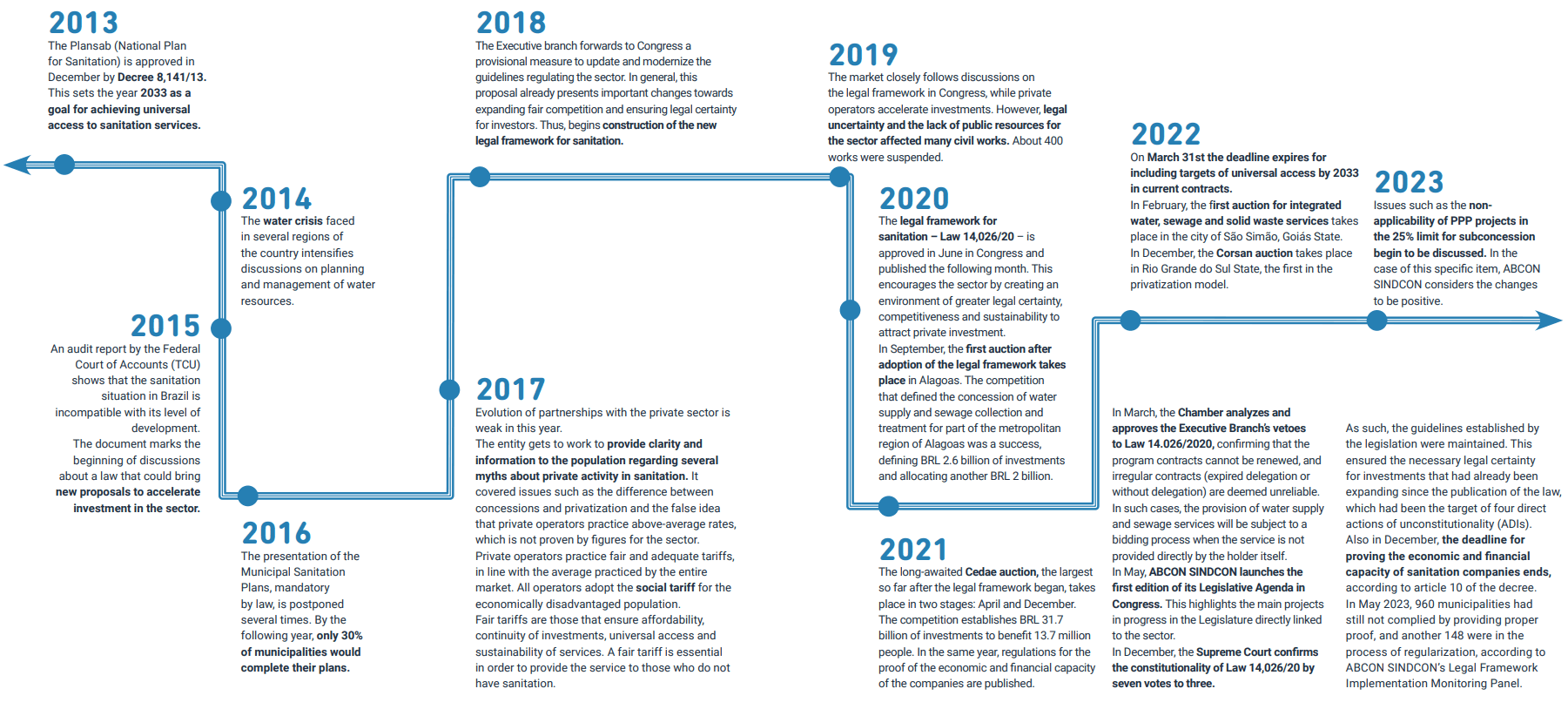
Source: 2023 Panorama of private sector participation in sanitation (pages 24 and 25)
Concessions
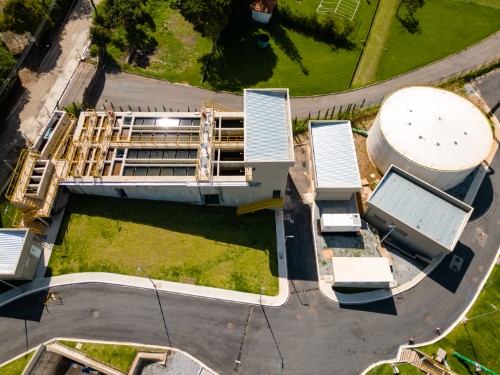
Águas do Imperador (Petrópolis/RJ)
Petrópolis, which celebrated 25 years of concession on January 1, 2023, is in second place among the municipalities of Rio de Janeiro in relation to the water loss rate and is among the ten best Brazilian cities, occupying the tenth position in the national ranking.
In 2022, the Araras Water Treatment Station (WTS) came into operation, adding 9.5 million liters per day to the system and equipped with fully automated processes, operated by a state-of-the-art Operational Control Center (CCO), with total reuse of processed water and resulting waste.
Operating since: 1998
Population of the municipality¹: 304,758
Water coverage²: 99.1%
Number of water treatment stations (WTS): 8
Sewage coverage ³: 89.1%
Sewage treated⁴: 80.9%
Number of sewage treatment stations (STS): 8
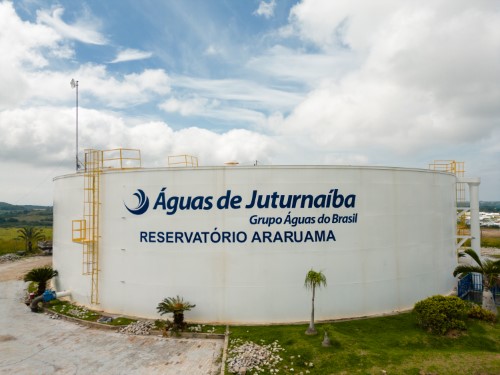
Águas de Juturnaíba (Araruama, Saquarema and Silva Jardim/RJ)
One of the pioneers of the Águas do Brasil Group, Águas de Juturnaíba completed 25 years of concession on March 16, 2023. In 2022, the concessionaire held the issue of the Group’s first green bonds aimed at expanding and improving supply systems of water and sewage systems in the municipalities where it operates. Another highlight of the year was the implementation of the Water Safety Plan.
Operating since: 1998
Population of the municipalities¹: 236,990
Water coverage²: 99%
Number of water treatment stations (WTS): 1
Sewage coverage ³: 78.1%
Sewage treated⁴: 100%
Number of sewage treatment stations (STS): 7
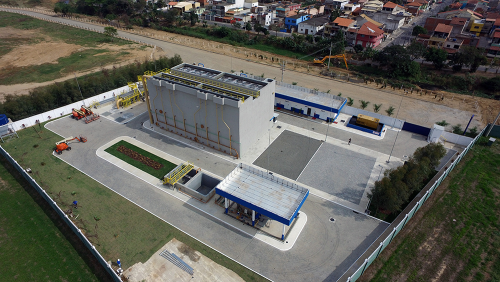
Águas do Paraíba (Campos dos Goytacazes/RJ)
Campos dos Goytacazes was highlighted in 2022 by Instituto Trata Brasil among the three cities in the country that have improved the most in terms of sanitation, both in treatment and collection, whose indicator jumped from 54.36%, in 2011, to 84.26%, in 2020. Before the arrival of the concessionaire, Campos did not have sewage treatment, and water reached the population intermittently.
Operating since: 1999
Population of the municipality¹: 474,667
Water coverage²: 100%
Number of water treatment stations (WTS): 3
Sewage coverage ³ 96%
Sewage treated⁴: 100%
Number of sewage treatment stations (STS): 8
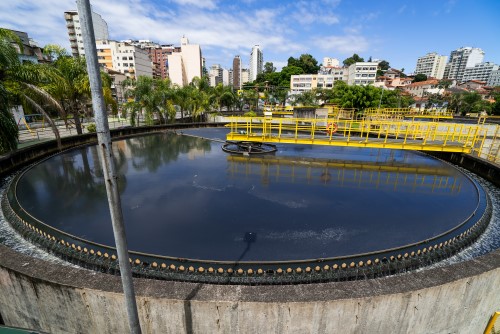
Águas de Niterói (Niterói/RJ)
The city of Niterói occupies the first place in the 2022 ranking of Instituto Trata Brasil in the state of Rio de Janeiro. In the 2023 national ranking by Instituto Trata Brasil, Niterói was listed as the fourth best city in Brazil in terms of sanitation. The concessionaire's Environmental Management System underwent the ABNT NBR ISO 14001 certification audit process in 2022, with certification in 2023. With strong interaction with the 119 communities in the concession area, Águas de Niterói has a history of social responsibility, based on transparent dialogue with community leaders.
Operating since: 1999
Population of the municipality1: 523,664
Water coverage²: 100%
Sewage coverage³: 95.6%
Sewage treated⁴: 100%
Number of sewage treatment stations (STS): 9
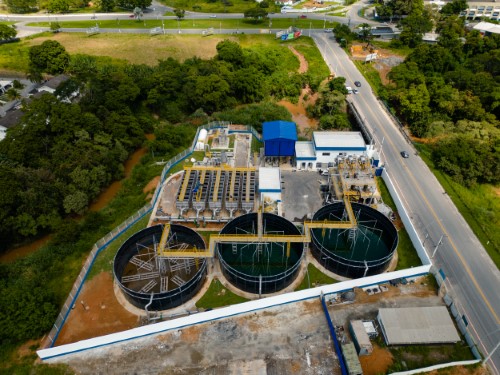
Águas das Agulhas Negras (Resende/RJ)
The ETE Ipiranga – with a capacity of 160 liters per second – had its work completed, taking the concessionaire to the 90% mark in sewage treatment. The concessionaire also stands out for its socio-environmental and cultural actions, which involved more than 2,000 people during the year.
Operating since: 2008
Population of the municipality¹: 128,460
Water coverage²: 100%
Number of water treatment stations (WTS): 7
Sewage coverage³: 99.9%
Sewage treated⁴: 72.4%
Number of sewage treatment stations (STS): 10
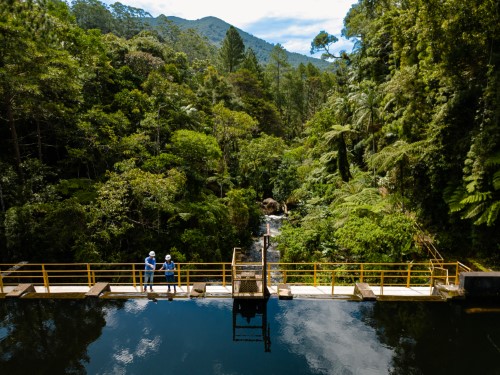
Águas de Nova Friburgo (Nova Friburgo/RJ)
Since taking over the treated water supply, removal, collection and treatment of sewage services in 2009, the concessionaire has increased from zero to more than 8 billion liters of treated sewage per year. In total, 11 supply systems produce around 35 million liters of water per day and provide quality water to practically 100% of the municipality's urban population.
Operating since: 2009
Population of the municipality¹: 204,625
Water coverage²: 99.9%
Number of water treatment stations (WTS): 12
Sewage coverage³: 96.8%
Sewage treated⁴: 97.8%
Number of sewage treatment stations (STS): 4
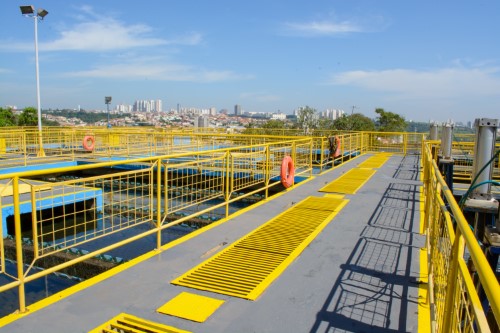
Águas de Votorantim (Votorantim/SP)
In 2022, civil and assembly works were implemented for the new Itapeva Reservoir, with a capacity of 500 cubic meters, to assist and maintain the regularity of the city's supply, in addition to meeting contractual milestones. With exemplary sewage coverage, the concessionaire also has a low rate of water losses, anticipating the goals of the Basic Sanitation Legal Framework.
Operating since: 2012
Population of the municipality¹: 137,319
Water coverage²: 100%
Number of water treatment stations (WTS): 4
Sewage coverage³: 99.4%
Sewage treated⁴: 93%
Number of sewage treatment stations (STS): 2
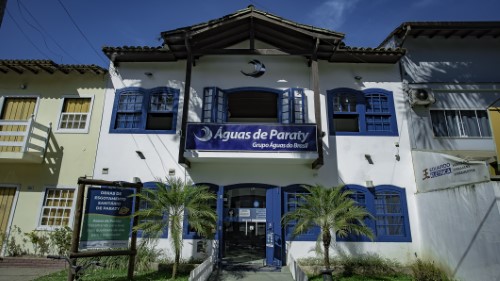
Águas de Paraty (Paraty/RJ)
Work began on STS Paraty, the first sewage treatment station in the urban area of the municipality, with a treatment capacity of 43 liters per second. The STS will contribute to increasing the quality of life in the city, which already has 100% coverage in the treated water supply.
Operating since: 2014
Population of the municipality¹: 50,592
Water coverage:² 100%
Number of water treatment stations (WTS): 2
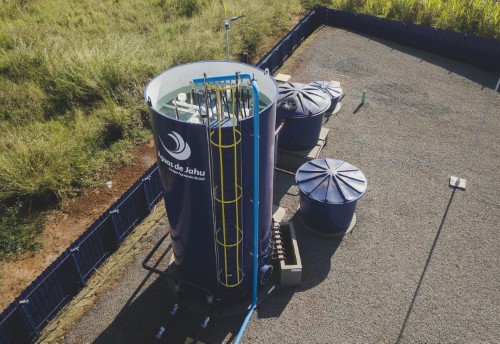
Águas de Jahu e Sanej (Jaú/SP)
The municipality stands out for the universalization of sanitation services, with 100% coverage in the distribution of treated water and in the collection, removal and treatment of sewage. The brand is the result of investments made by the concessionaires, which exceeded R$82 million since the beginning of the concession.
Operating since: 2015
Population of the municipality¹: 132,351
Water coverage²: 100%
Number of water treatment stations (WTS): 1
Sewage coverage³: 100%
Sewage treated⁴: 100%
Number of sewage treatment stations (STS): 4
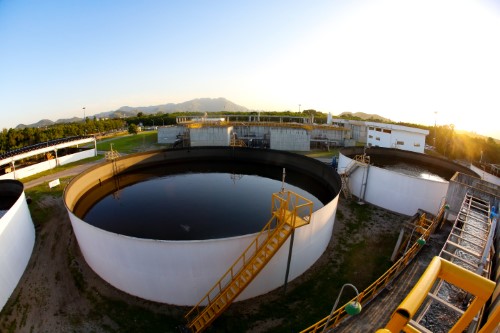
Zona Oeste Mais Saneamento (Rio de Janeiro/RJ)
With the inauguration of STS Bangu, with a treatment capacity of 500 liters per second and responsible for benefiting 300 thousand residents, there was a reduction of 28 million liters of raw sewage dumped per day into the Sarapuí River, which flows into Guanabara Bay. The company completed a decade of activities in 2022 and invested R$187 million in sanitation works during the year.
Operating since: 2012
Population of the municipality: 1.88 million
Water coverage: 76%
Seweage treated: 75%
Number of sewage treatment stations (STS): 171 (24 public ETEs + 147 ETEs in housing groups
Note: Collection and treatment indicators are defined according to the concession agreement with the Rio de Janeiro Municipal Government.
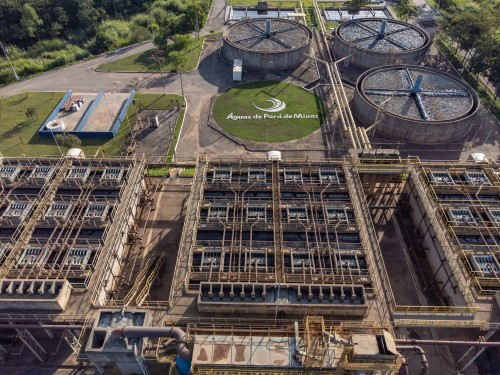
Águas de Pará de Minas (Pará de Minas/MG)
The expansion of water treatment capacity to 300 liters per second began with the construction of WTS Nossa Senhora das Graças II. The concessionaire has sanitation levels above the standards of Brazilian municipalities and water losses below the national average. In 2022, the Rural Sanitation Project, in partnership with the City Hall, had its first stage completed, with the installation of domestic sewage treatment systems in 23 rural properties.
Operating since: 2015
Population of the municipality¹: 97,507
Water coverage²: 100%
Number of water treatment stations (WTS): 1
Sewage coverage³: 99.5%
Sewage treated⁴: 100%
Number of sewage treatment stations (STS): 9
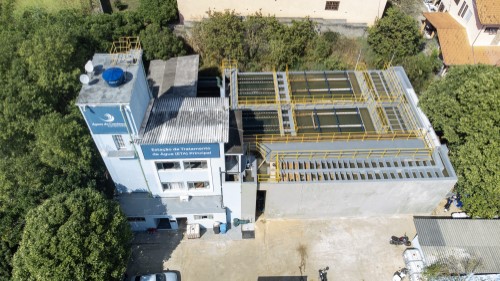
Águas da Condessa (Paraíba do Sul/RJ)
The concessionaire concluded, in 2022, the studies and projects of the Sanitary Sewage System, covering the collection networks, pumping, drainage and treatment unit. The STS Centro will be implemented in an area of 2,500 square meters, in the Cerâmica neighborhood, in two stages with an initial module of 30 liters per second and expansion forecast to 60 liters per second. This will be the city’s first sewage treatment station, contributing to the environment and improving the population's’quality of life.
Operating since: 2020
Population of the municipality¹: 41,786
Water coverage²: 99.4%
Number of water treatment stations (WTS): 1
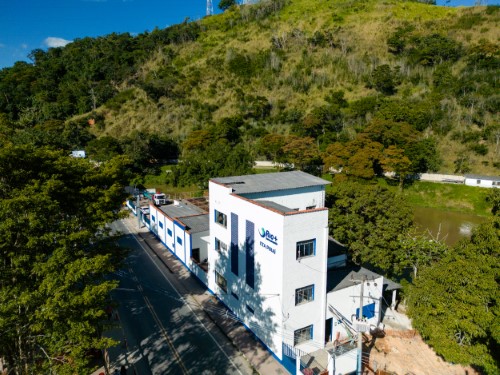
Rio+Saneamento (Rio de Janeiro/RJ)
The new concessionaire is already a giant: responsible for sanitation services in 18 municipalities in Rio de Janeiro, including 24 neighborhoods in the West Zone of Rio, Rio+Saneamento will improve the quality of life of 2.6 million people. In the first five months of operation, almost R$50 million was invested in works and interventions to guarantee the quality of water and sewage services.
Operating since: 2022
Population of the concession area: 2.6 million
Number of water treatment stations (WTS): 32
Number of treatment units: 9
Number of sewage treatment stations (STS): 5 active
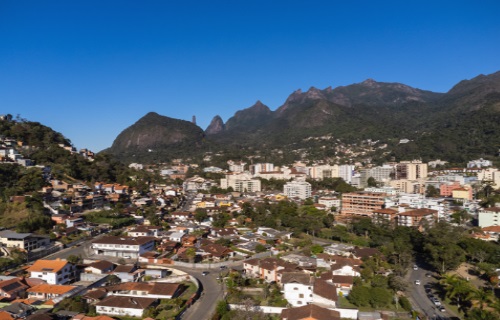
Águas da Imperatriz (Teresópolis/RJ)
In August 2023, the Group won the concession for water supply and sewage treatment services in Teresópolis, in Rio de Janeiro. The investment for the 25-year concession is of approximately R$ 480 million in infrastructure for the construction of sewage networks, treatment stations, pumping stations and biodigesters.
Municipality: Teresópolis (RJ)
Population: 165,000 inhabitants
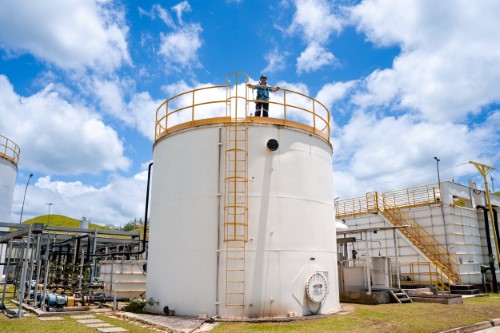
SAAL Industrial
SAAL Industrial operates in the countryside of the state of Rio de Janeiro, in Resende and Itatiaia, with two industrial units (Land Rover and Jaguar). The segment’s operations focus on the production of industrial and drinking water, and the treatment of industrial and sanitary effluents, meeting the specific requirements of each production process of customers in the automotive industry.
Operating since: 2013
Number of water treatment stations (WTS): 2
Number of sewage treatment stations (STS): 2
¹ Population preview calculated based on the results of the 2022 Demographic Census from the Brazilian Institute of Geography and Statistics (IBGE).
² SNIS – IN023 Code | Urban water supply index.
³ SNIS – IN047 Code | Urbane sewage supply index.
4 SNIS – IN016 Code | Sewage treatment index.
